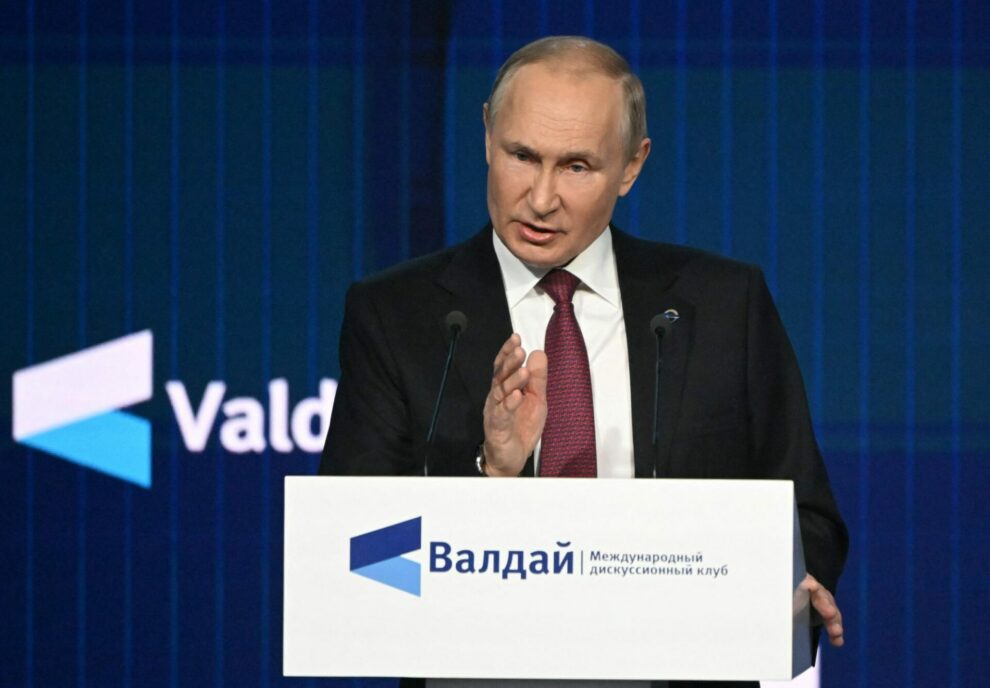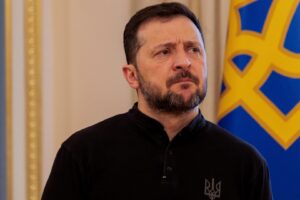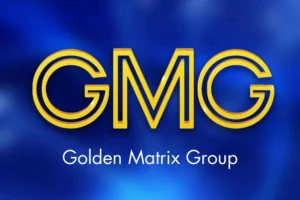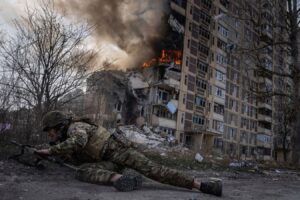Why did Vladimir Putin invade Ukraine? The answer to this question really depends on when you’re asking. In the months leading up to the invasion, the Russian dictator focused his ire on NATO and sought to blame rising tensions around Ukraine on the military alliance’s post-Cold War expansion. As his troops crossed the border on February 24, Putin changed tack and declared a crusade against “Ukrainian Nazis.” More recently, he has sought to portray Ukraine as a “terrorist state” while insisting that Russia is in fact fighting against “Satanism.”
None of these arguments stands up to serious scrutiny. Instead, the various different narratives coming out of the Kremlin reflect Moscow’s increasingly desperate efforts to justify what is in reality an old-fashioned colonial war of imperial conquest.
Putin has long sought to use NATO expansion as an excuse for his own aggressive foreign policies. This plays well with the Russian public and also resonates among segments of the international community who believe the United States has become too dominant since the end of the Cold War. However, Putin’s attempts to position the invasion of Ukraine as a reasonable response to NATO encroachment have been comprehensively debunked by his own actions.
According to Reuters, Ukraine informed Russia during the first days of the invasion that it was ready to meet Moscow’s demands and rule out the possibility of future NATO membership, only for this offer to be rejected by Putin. Ukrainian President Volodymyr Zelenskyy went public in the following weeks with similar proposals to abandon Ukraine’s NATO ambitions, but Russia chose to continue its invasion.
The entire notion that Russia views NATO as a credible security threat was further undermined in summer 2022 when Moscow passively accepted neighboring Finland’s historic decision to join the military alliance. Putin has repeatedly cited Ukraine’s deepening NATO ties as justification for his invasion, but the prospect of imminent Finnish membership provoked no meaningful security response whatsoever from the Kremlin.
If Putin genuinely believed a NATO invasion of Russia was even a remote possibility, he would surely have reinforced the Finnish border. On the contrary, in the months following Helsinki’s decision to join the alliance, Russia dramatically reduced its military presence close to Finland and the nearby NATO member Baltic states in order to bolster the invasion of Ukraine. Whatever Putin may say in public, he clearly understands that NATO poses no threat to Russia.
Russian myth-making about “Ukrainian Nazis” is even older than complaints over NATO expansion and dates all the way back to Soviet World War II propaganda. For decades, Moscow has exaggerated wartime cooperation between Ukrainian nationalist groups and the Third Reich while conveniently ignoring the far more consequential Nazi-Soviet Pact. By conflating Ukraine’s centuries-old liberation movement with Nazism, generations of Kremlin leaders have sought to render Ukrainian national identity toxic in the eyes of domestic and international audiences alike.
Putin’s enthusiasm for the “Nazi Ukraine” trope is very much in line with his broader efforts to place the Soviet World War II experience at the heart of modern Russian identity. Over the past two decades, Putin has turned traditional Russian reverence for the generation who defeated Hitler into a quasi-religious victory cult complete with its own feast days, holy relics, and doctrinal dogmas. This has enabled him to whitewash the crimes of the Soviet era while attacking contemporary adversaries as the spiritual successors to the Nazis. In Putin’s Russia, accusations of Nazism are a routine feature of the public discourse and have been leveled against a dizzying array of individuals, organizations, and entire countries, but Ukraine remains by far the most popular target.
The effectiveness of these tactics has always depended heavily on outside ignorance of Ukraine and Russia-centric reporting by Moscow-based international correspondents. Unfortunately for Putin, his invasion has shone an unprecedented media spotlight on Ukraine that has done much to debunk the whole “Nazi Ukraine” narrative.
This was long overdue. Throughout the past 31 years of Ukrainian independence, the far-right has never come close to achieving power in Ukraine and remains significantly less influential than in many other European countries. While far-right candidate Marine Le Pen received 41.45% in France’s 2022 presidential election, the Ukrainian far-right typically struggles to secure low single digit support at the ballot box. During Ukraine’s last presidential election in 2019, the leading nationalist candidate garnered 1.6% of the vote. Months later in the country’s most recent parliamentary election, many of Ukraine’s far-right parties joined forces in a bid to improve their fortunes. This united nationalist platform failed miserably, winning a mere 2.15% of votes.
Nothing highlights the absurdity of Russia’s “Nazi Ukraine” allegations better than the rise of Volodymyr Zelenskyy. The Ukrainian President is both Jewish and a native Russian speaker. According to the Kremlin, this should make him deeply unappealing to Ukrainian voters. On the contrary, Zelenskyy was elected president by a record margin and subsequently secured a unique parliamentary majority for his newly formed political party. This success was all the more remarkable as it was achieved during wartime elections held amid an atmosphere of heightened patriotic fervor.
Since the start of the invasion, Russia’s failing efforts to portray Ukraine as a Nazi state have forced Moscow into ever more implausible mental gymnastics. Unable to produce any actual Ukrainian Nazis, regime officials and propaganda proxies have attempted to argue that the very idea of an independent Ukraine is in itself a Nazi concept, while also acknowledging that Putin’s stated war aim of “de-Nazification” in practice means the “de-Ukrainization” of Ukraine.
The Kremlin’s confusion was perhaps most immediately evident in the bizarre and disgraceful anti-Semitic comments made by Russian Foreign Minister Sergei Lavrov during a May appearance on Italian TV program Zona Bianca. When asked to address the obvious contradictions between Russia’s “Nazi Ukraine” claims and the fact that Ukraine has a Jewish president, Lavrov responded by declaring that Adolf Hitler also had “Jewish blood.” His statement sparked a wave of global condemnation, with Putin eventually forced to intervene and offer a personal apology to Israeli leaders.
This embarrassing incident illustrated the remarkable recent degradation of Russian diplomacy, which has now reached the point where it is often indistinguishable from internet conspiracy theories. Forced by Putin’s invasion to defend the indefensible, Russia’s top diplomats have retreated into an alternative reality world of blanket denials and dark fantasies. While Lavrov rants about “Jewish Hitler,” Russian Ambassador to the UN Vasily Nebenzya stuns his colleagues with fantastic tales of genetically engineered Ukrainian mosquitoes. No wonder exasperated British Ambassador Barbara Woodward recently felt moved to ask, “How much more of this nonsense do we have to endure?”
Source: Atlantic Council









